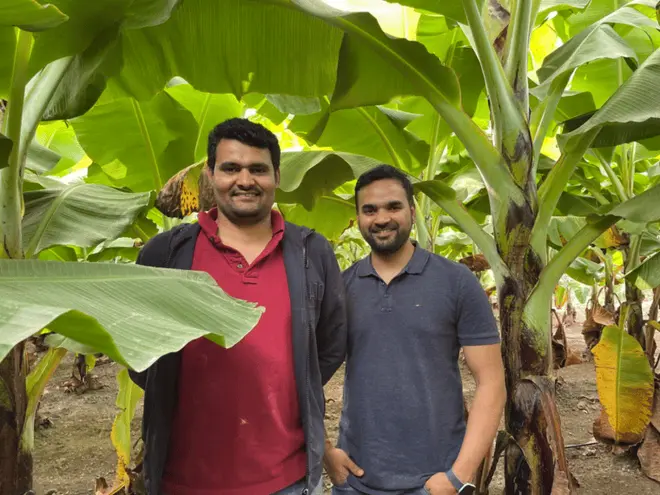
Fyllo’s flagship devices — Nero for soil moisture and Kairo for climate tracking — connect to a cloud server, using AI to provide farmers with real-time insights on irrigation, pests, and weather.
Bengaluru-based agritech firm Fyllo, which manufactures and markets farm devices Nero to monitor soil moisture and Kairo to track climate conditions, is working on launching a few more products in the country.
The company’s co-founder, Sudhanshu Rai, told businessline in an online interaction that Fyllo will first strengthen its domestic distribution network before focusing on markets abroad.
Fyllo provides these devices to farmers, who then place them on their fields. The devices are, in turn, connected to a cloud server that utilises artificial intelligence to provide insights into potential pest and insect attacks, weather developments, and soil moisture levels.
Price barrier
Six months ago, Fyllo launched a new product, Nero Infinity. The company was importing sensors that were costly and had a short lifespan.
“The life of a sensor was hardly 3-1/2-4 years. The cost was ₹3,500-4,000 for a piece. So, the product cost was upwards of ₹20,000, which was a barrier,” he said.

Fyllo founders (from left) Sumit Sheorah and Sudhanshu Rai. While its devices are deployed in Europe and Mexico, Fyllo is focused on strengthening its 40-distributor, 300-retailer network in India before expanding globally.
The company then worked with one of the IITs to develop a sensor. To ensure that the device worked for a longer period, the research team tested it with a PVC pipe, which has a longer life.
“We put PVC pipe and our whole electronics. That’s where this whole concept of generating electromagnetic waves and then measuring what is being returned from them. It is called the standing wave ratio (SWR) principle,” said Rai.
Overnight change
The company again collaborated with one of the IITs to validate and enhance the model’s robustness. It also helped Fyllo reduce the cost to ₹6,000.
“The result was that within a month, we received 8,000 bookings from farmers. They gave ₹1,000 for the bookings. The maximum we had sold in a financial year was 4,000 devices. So that kind of change it brought. Because of the longer life (over 10 years), we called it Nero Infinity. Nero means water,” said the company’s co-founder, who had begun his career with an IT firm.
The company is also working on other products, which will be launched soon, although Rai did not provide further details.
Fyllo’s equipment is used by over 40 companies as part of their contract farming projects with farmers. “Companies look for a few things in contract farming. One quality of the produce by adopting precision farming that will lead to better profit margin for them, Second is sustainability – less water, less pesticides and fungicides, and the third is improved returns for growers,” he said.
How it all began
Most of the corporates the company works with are export-oriented, procuring directly from farmers and getting them processed. There are also a few seed and input companies that use these devices on their research and development farms, said Rai.
On the company’s journey, he said it collected data received by Kisan Call Centres from 2014 to 2019. At least 90 per cent of the queries pertained to pests and diseases, as well as when farmers should irrigate. “Most of these queries came from the Nashik area. We were happy that our idea of entering the field with our devices was validated. We went to Nashik with a mobile mockup. Three or four farmers showed interest, and we went commercial straight away,” the co-founder said.
Fyllo’s journey began with the grapes. Till now, 50 per cent of the company’s devices are deployed in grapes. The grape farmers adopted it because the company effectively marketed it.
Working model
Besides grapes, growers of bananas, potatoes, pomegranates, other fruits and vegetables, and sugarcane are now utilising the company’s devices. “For sugar mills, the sugar content is declining. So, there is a push from that side,” Rai said, adding that chilli and tomato farmers, besides tea planters, too have begun to use the company’s devices.
On the working model, Rai said the company sells its IoT device upfront and then charges an annual subscription separately for services. “The costs are not even what farmers pay for their seeds,” he said.
On exporting the devices, Rai said the company would primarily focus on India and make better products. It may consider setting up a distribution network abroad.
“India is a huge market, and we are building our distribution network. We have about 40 distributors and 300-400 retailers. In the global market, we hold a competitive edge and demand is there, but we will first focus on India,” the co-founder said.
However, Fyllo’s devices are deployed in France, Mexico and a few other European countries. In India, it has a presence in 13 States, with a primary focus on Maharashtra, Gujarat, Karnataka, Tamil Nadu, Madhya Pradesh, Punjab, Haryana, and Himachal.
“Even in these States, our presence is strong in crop clusters. It means we are present in 4-5 districts of Maharashtra and not all. It is similar in other States, too,” said Rai, adding that the company has a collaboration with Coramandel in Andhra Pradesh and Telangana.
Published on August 15, 2025
